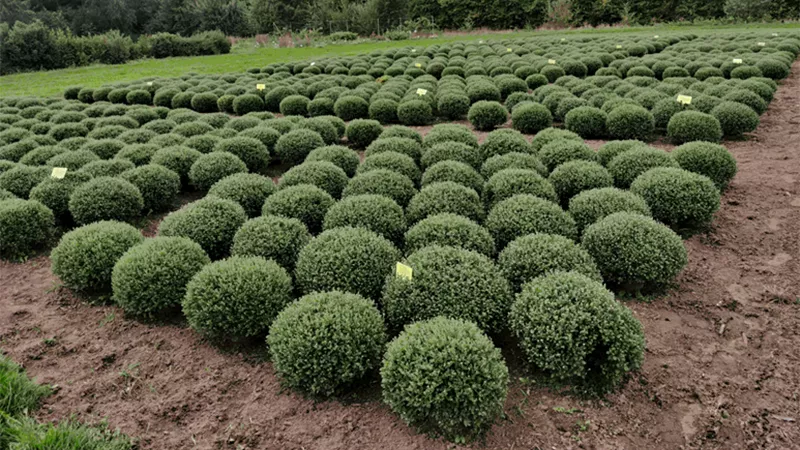Inspirational idea: Recycling waste from horticulture into substrates and fertilisers
In the Netherlands and Belgium, two Operational Groups are working with the same aim to put waste from horticultural production to good use
The agricultural and horticultural sectors produce a lot of organic waste every year. At the same time, compost in agriculture is often derived from non-renewable or non-environmentally friendly sources. On the one hand, substrates containing peat are frequently found in horticulture, but it is under high pressure because of the need to protect and restore peatland areas, and reduce emissions. On the other hand, green waste, such as stems, leaves and rejected fruits of plants, is composted in a low-grade recycling process in which a high amount of CO2 can bereleased. Composting also releases methane and other harmful gases. In the Netherlands and Belgium, two Operational Groups (OGs) are working with the same aim to recycle waste from horticultural production into substrates and fertilisers to limit negative impacts on the environment.
Reuse of growing substrates for circular horticulture in Belgium
The Operational Group ‘RE-PEAT’ aims to bring the reuse of cultivation substrates into more common practice, with the ultimate goal of drastically reducing the use of fresh peat and other non-renewable raw materials in cultivation substrates.
For RE-PEAT, the first step was to make an inventory of the availability of usable residual substrate products from fruit, vegetables and ornamental horticulture; then be sure that the final product is of good quality and interesting for strawberry and ornamental plants. Its new substrate will be compared to a traditional one.
They bring together growers from different horticultural sectors to upgrade growing substrates in a cascade system from strawberry cultivation to ornamental plant cultivation. Within the project, growing substrates are reused at field level by the growers. In parallel, at the test centres, chemical and physical analyses are being made. “Within this Operational Group, we want to expand and disseminate the knowledge already collected by the various partners to a wider target audience and to bring the various links in the chain (growers from different target groups) in contact with each other to share knowledge but also to further stimulate collaborations” explains Bart Vandecasteele from ILVO, one of the scientific partners.
Currently, the OG partners are in contact with OVAM (Public Waste Agency) and, supported by the results from the practice and the trial centres, are trying to obtain a generic raw materials declaration for strawberry substrate, and an administrative simplification for the reuse of substrates in general. The next steps will be to work on the costs of reusing substrates, including extra labour for removing plant residues, energy costs for possible hygienisation, transport costs, etc.

Recycling of organic waste streams into organic fertilisers in the Netherlands
In the Dutch OG ‘Circular agriculture and horticulture through recycling of organic waste streams into organic fertilisers’, the aim is to develop processes to fully recycle different types of organic waste streams from agriculture and horticulture into organic fertilisers (organic potassium, biological nitrogen and organic phosphate).
For the Dutch OG, the companies involved in the project are developing processes to fully recycle five different types of organic waste streams: the organic residual flows come from pepper cultivation (greenhouse), chrysanthemum cultivation (open ground in the greenhouse), alstroemeria cultivation (open ground in the greenhouse), ilex and peony cultivation (open ground outside) and Brussels sprouts cultivation (outdoor vegetable cultivation). They have investigated four different techniques to achieve their goal in recent years. This showed that their goal is not easy to achieve. “But despite this, we are currently 70% ready with the process” explains Peter Klein, project leader. They expect to be ready to build a pilot by the end of this year. “Our project is innovative because we recover nutrients from plant residues to produce high-quality fertilisers. Our aim is to achieve the same production with organic fertilisers as with chemical fertilisers. So, we set high standards for the quality of our products” adds Peter Klein. After the development phase, they want to build a pilot and move to scale-up as soon as possible. As in RE-PEAT, the Dutch partners in this OG are also testing the efficiency of the final products (the organic fertilisers).
Project information
Contact:
RE-PEAT
Liesbet Blindeman Liesbet.blindeman@pcsierteelt.be
Bart Vandecasteele Bart.Vandecasteele@ilvo.vlaanderen.be
Circular agriculture and horticulture through recycling of organic waste streams into organic fertilizers
Peter Klein peter@biota.nu
More information: